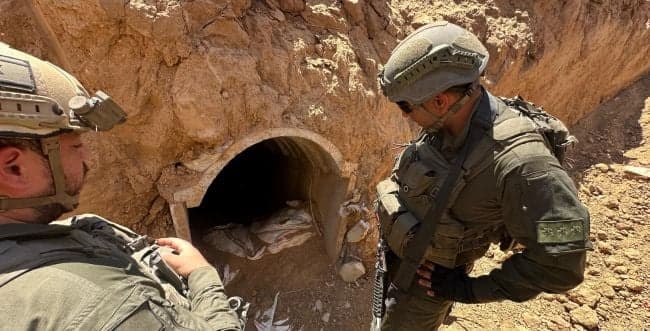Hamas' Underground Network
Israeli expert reveals: 40% of Hamas tunnels still operational
The Israeli Defense Forces (IDF) continue to face challenges in their ongoing military operations in Gaza, as experts reveal that a significant portion of Hamas' military infrastructure remains intact. According to Yoni Ben Menachem, an expert in Middle Eastern affairs from the Jerusalem Center for Security and Foreign Affairs, around 40% of Hamas' extensive tunnel network is still operational. These tunnels, which span hundreds of kilometers, remain a major obstacle for Israeli forces.

Despite over a year of intense military operations aimed at dismantling Hamas, Israel is still uncovering weapons depots, tunnels, and Hamas fighters. The group's military capabilities, including its underground network, continue to pose a significant threat. "There are still very long tunnels that Israel has yet to locate, some of them possibly holding hostages inside," said Ben Menachem. "This requires a large-scale operation and considerable resources that Israel does not currently possess."
Hamas, which shocked Israel with a large-scale attack on October 7, 2023, killing over 1,200 Israelis and taking 250 hostages, has had over 20 years to build up its military infrastructure. Experts estimate that dismantling the terrorist group's capabilities could take years, with some estimating it may require two to three years to fully eliminate the threat. In addition to Hamas, other groups like the Palestinian Islamic Jihad (PIJ) have bolstered the overall threat level, with around 30,000 fighters involved in the conflict, according to Jerusalem post reports.
The ongoing war has also taken a toll on both sides, with over 45,000 Palestinians reported killed and more than 107,000 injured, according to the Hamas-run Gaza Health Ministry. In Israel, 390 soldiers have been killed in ground operations.
As Israel continues its military operations in Gaza, including airstrikes on Hamas targets and ground incursions in key areas, the debate on long-term strategy intensifies. Experts such as Prof. Efraim Inbar and Dr. Eitan Shamir have criticized Israel's "mowing the grass" strategy, which involves periodic, limited military operations to suppress Hamas, but has failed to deliver a permanent resolution. Shamir argues that to fully neutralize Hamas, Israel may need to adopt a more drastic strategy, such as occupying Gaza or imposing military rule to ensure complete control.
Meanwhile, diplomatic efforts to secure a ceasefire and negotiate the release of hostages continue, though these talks have been stymied by Hamas' demand for a full Israeli withdrawal from Gaza, a condition that the Israeli government has thus far rejected.
The prolonged conflict has also raised questions about the future of Gaza. Israeli Prime Minister Benjamin Netanyahu has signaled opposition to both Hamas' return to power and the re-establishment of the Palestinian Authority in the territory. The debate over how to manage Gaza post-conflict remains unresolved, with significant pressure on Israel's leadership to formulate a coherent and lasting policy.
As the war drags on, the fate of the hostages held by Hamas continues to be a major factor influencing Israel’s strategy, with the group's leverage over hostages serving as a crucial negotiating point in the ongoing crisis.